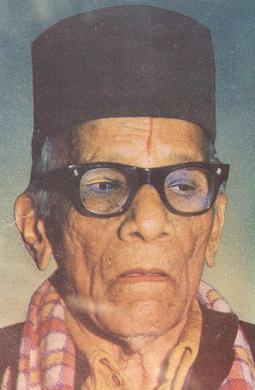
Masti Venkatesha Iyengar was a well-known writer in Kannada language. He was the fourth among Kannada writers to be honored with the Jnanpith Award, the highest literary honor conferred in India. He was popularly referred to as Maasti Kannadada Aasti which means "Maasti, Kannada's Treasure". He is most renowned for his short stories. He wrote under the pen name Srinivasa. He was honoured with the title Rajasevasakta by then Maharaja of Mysore Nalvadi Krishnaraja Wadeyar.

Basappa Danappa "B. D." Jatti was the fifth vice president of India, serving from 1974 to 1979. He was the acting president of India from 11 February to 25 July 1977. He also served as the chief minister of Karnataka. Jatti rose from a being a Municipality member to India's second-highest office during a five-decade-long chequered political career.
Ramakrishna Mahabaleshwar Hegde was an Indian politician who served as the third Chief Minister of Karnataka for three terms between 1983 and 1988. He was elected to the Karnataka Legislative Assembly in 1957, 1962, 1967, 1983, 1985 and 1989, and to the Rajya Sabha for two terms, 1978–83 and 1996–2002. He also served as Minister of Commerce and Industry in the Union government (1998–1999).

Anant Nagarkatte is an Indian actor whose predominant contribution has been in Kannada cinema. He has acted in over 300 films which include over 200 Kannada films as well as Hindi, Telugu, Marathi, Malayalam and English films. He has featured in theatre plays, parallel cinema and television shows.

Purohita Thirunarayanaiyengar Narasimhachar, commonly known as PuTiNa, was a playwright and poet in the Kannada language. Along with, Kuvempu and D. R. Bendre, he forms the well-known trio of Kannada Navodaya poets. He was awarded the Padma Shri by the Government of India in 1991. He was a Sahitya Akademi fellow and the winner of the Pampa Award, awarded by the Government of Karnataka in 1991.

Kengal Hanumanthaiah, also spelt as Kengal Hanumanthaiya, was the second Chief Minister of Karnataka from 30 March 1952 to 19 August 1956. He contributed to the construction of Vidhana Soudha, the seat of the state legislature.
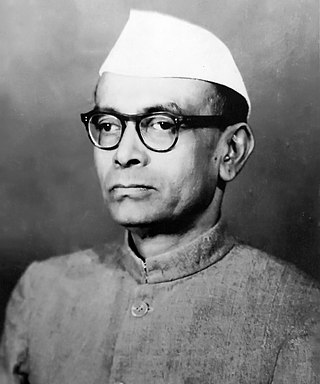
T. Mariappa (1904-1964) was a finance minister of Mysore State, India.
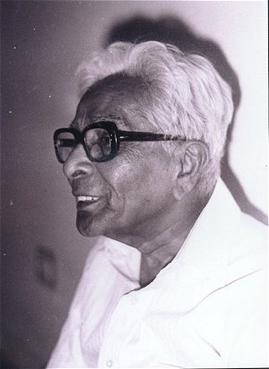
Akkihebbalu Narasimha Murthy Rao was an Indian writer. He wrote in Kannada.

Marpadi Veerappa Moily is an Indian politician belonging to the Indian National Congress from the state of Karnataka. Moily was the former Chief Minister of the Indian state of Karnataka.
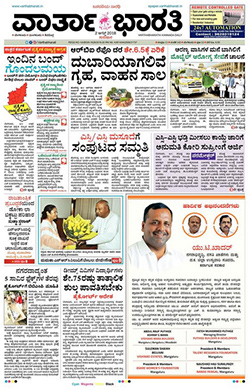
Vartha Bharati also spelled as Vartha Bharathi, is a Kannada daily newspaper published simultaneously from Bangalore, Mangalore and Shimoga. It was launched in August 2003. It is one of nine state level Kannada daily newspapers of Karnataka, as recognized by the Information and Public Relations Department, Government of Karnataka.
Nittoor Srinivasa Rao or Nittur Srinivasa Rao was a Gandhian who participated in the Indian independence movement. He was the Chief Justice of the High Court of Mysore State and also the first chief of the Central Vigilance Commission of India. He was also chosen as the acting Governor of the Mysore state and was the first person to translate Mahatma Gandhi's autobiography to the Kannada language.

Mysore Venkatadasappa Seetharamiah or M. V. See was an Indian Kannada language author, editor and translator. Through a career spanning over sixty years, he published over 100 works spanning short stories, poetry, novels, and dramas. Some of his notable works included Sri Vijaya kruta Kavirajamarga, a retelling of the classical Kavirajamarga, Udayadityalankara, a work on Kannada poetics, and also other works on ancient Kannada language grammar.

Tekur Subramanyam was an Indian Freedom Fighter and politician from Bellary, India. For his involvement in the Independence Movement, he was jailed several times by the British Colonial administration, many times at Bellary's Allipura Jail. Tekur was the first post-independence MP of Bellary, elected thrice in a row since 1952. He was also the Political Secretary to India's first Prime Minister, Jawaharlal Nehru.

Rattihalli Nagendra Rao was an Indian theatre actor, film actor and director in South Indian cinema. Following his career in theatre, Rao turned to film a where he became an actor, director, producer, screenwriter and occasional composer. He is considered one of the most influential personalities in the history of South Indian cinema.

Prathap Simha is an Indian journalist and politician who was a Member of Parliament for Mysore from 2014 to 2024, as well as a member of the Bharatiya Janata Party. Prior to his parliamentary terms, he was the president of the party's youth wing in Karnataka.

Madhva Brahmins, are Hindu Brahmin communities in India, who follow Sadh Vaishnavism and Dvaita philosophy propounded by Madhvacharya. They are found mostly in the Indian states of Karnataka, Maharashtra, Goa, Tamil Nadu, Kerala, Telangana and Andhra Pradesh.

Chakravarty Sulibele is an Indian writer who predominantly writes in the Kannada and Hindi languages. He is the founder of Yuva Brigade and Sodari Nivedita Pratishtana.
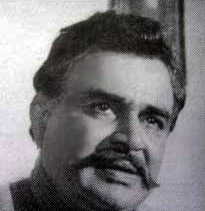
Venkataraju known by his professional name Rajanand (1927-2004), was an Indian actor in the Kannada film industry. Some of the notable films of Rajanand as an actor include Operation Diamond Racket (1978), Mayura (1975), and Eradu Kanasu (1974).

Haleyuru Srinivasa Krishnaswamy Iyengar was a Kannada columnist, essayist, novelist, critic and teacher of Economics and Commerce studies in Mysore. He is remembered for his character sketches and short essays on personalities and issues of national & international import, in his weekly column "Varada Vyakthi". These appeared in the Kannada magazine "Sudha" continuously for nearly two decades. His literary critique "Kannadadalli Vidambana Sahitya" won him the Kannada Sahitya Akademi Award in 1981. His perspective on elements of Vishistadvaita in the works of Kuvempu were brought forth in his book "Kuvempu Sahityadalli Vishistadvaita – Darshana". H. S. K. penned close to thousand character sketches over two decades. These were later published in four collected volumes. He received the "Rajyotsava Award" from Government of Karnataka in 1997. For his lifetime contribution to Journalism and Kannada literature, the University of Mysore conferred a doctorate degree on him in 2004.

















